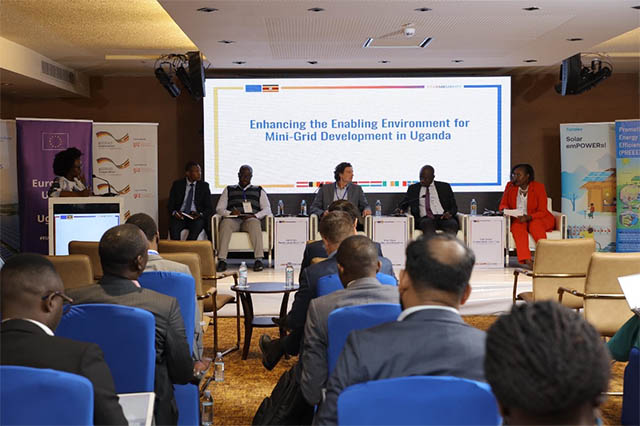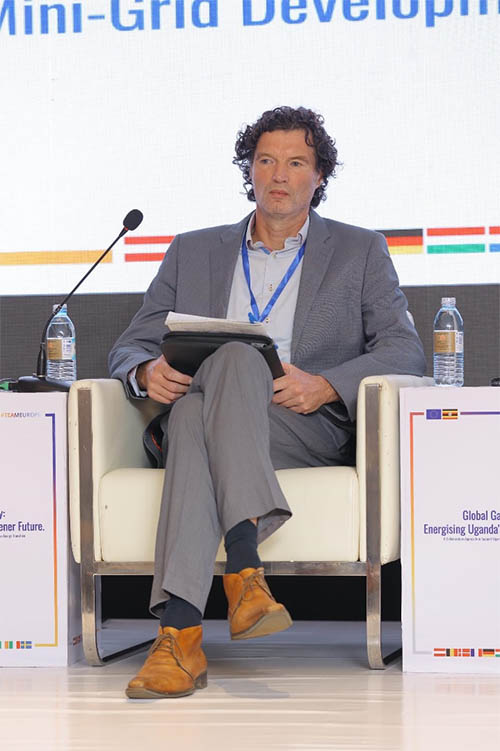
KAMPALA, Uganda | THE INDEPENDENT | Uganda’s quest for rural electrification through mini-grids requires effective public-private partnerships, industry experts and government officials agreed Thursday.
At a high-level panel discussion, “Enhancing the Enabling Environment for Mini-Grid Development in Uganda,” speakers emphasized the importance of collaboration to overcome regulatory and financial challenges.
Alex Wanume, Country Director for NOA Uganda, highlighted the challenges faced by mini-grid developers.
“We’re perceived as exploiting rural communities with high tariffs, hindering our ability to operate effectively,” Wanume said.
NOA Uganda operates 31 mini-grids nationwide and has a pipeline of upcoming projects. Wanume stressed the need for trust and cooperation between stakeholders.
“To achieve 2,000 mini-grids by 2030, significant adjustments are necessary,” Wanume said. “A 20-year concession period would allow us to plan for upscales and reinvestments, navigating demand risks and low capacity.”
Jeroen Van Linden, Regional Project Coordinator Beyond the Grid Fund for Africa NIRAS, emphasized regulatory framework shortcomings.
“Effective frameworks should outline licensing, concession periods, tariff approval, grid arrival, and compensation mechanisms,” Van Linden said.
Van Linden noted that concession periods are critical for mini-grid development.
“The devil is in the details, which are often missing, causing insecurity for mini-grid developers,” Van Linden said.



Patrick Tutembe, Chief Economist at the Electricity Regulatory Authority (ERA), stressed investment recovery.
“One thing that is very clear in regulation in our context is that any investment has to be recovered. Costs of investment have been recovered, including the cost of operation and the cost of capital,” Tutembe said.
To ensure investment recovery, the government has capped customer charges at 30 cents.
Tutembe noted challenges in rural areas, including low demand and limited economic centers.
“They tend to be in far-flung rural areas with probably few economic centers. And that has a very big implication about the two things we’re talking about, the tariff and the concession premium,” Tutembe said.
On concession periods, Tutembe said: “If the grid arrives before the concession agreement, it means that the government takes one of the most possible options is for the government to actually do compensation of the investor.”
Elizabeth Kaijuka Okwenjye, Principal Energy Officer at the Ministry of Energy and Mineral Development, highlighted key challenges facing mini-grid development.
“Inadequate regulatory framework, lack of anchor loads, preference for grid connection over mini-grids, operation and maintenance challenges, and license duration,” Okwenjye explained.
Okwenjye noted that Uganda has up to 500 mini-grid sites that are realistic for implementation.
The government is working to address regulatory framework challenges through the Promotion of Mini Grids Project.
“We’ve developed instruments and mechanisms, including bundled tenders and a concession framework, to provide subsidies to developers and promote private sector investment with government support,” Okwenjye said.
Henry Jumba, Country Coordinator for GET Transform under GIZ, emphasized private sector involvement.
“The private sector brings in the much-needed financing and expertise to develop and operate mini-grids efficiently,” Jumba said.
Jumba explained that public-private partnerships balance government and private sector interests.
“Decision-making at different levels requires coordination and implementation frameworks across the board,” Jumba added.
One of the biggest risks in the mini-grid business is grid arrival, Jumba noted.
“If I’m going to install a mini-grid right now and in the next two years, the grid is arriving, that means my business case is no longer viable. I’m out of business.”
To address this challenge, public-private partnerships offer exclusivity for developers through government guarantees, Jumba said.
Team Europe, comprising the European Union, Germany, and other partners, supports Uganda’s rural electrification through pioneering mini-grid initiatives.
The Pro Mini Grids project, funded by the European Union with 3.7 million euros and Germany with 0.8 million euros, has successfully demonstrated a sustainable electricity supply model for remote areas.
EU Ambassador to Uganda Jan Sadek noted, “Uganda and the EU have an aligned vision for a just and clean energy transition.”
“As Uganda’s largest development ally, we are committed to supporting Uganda’s energy sector,” Sadek said.
The EU’s support focuses on rural electrification, renewable energy, and regional energy connectivity.
Key initiatives include the Pro Mini Grids project, GET Access Uganda, and the Beyond the Grid Fund for Africa.
Sadek emphasized, “Team Europe is at the forefront of key initiatives, catalyzing progress through strategic investments and collaborative efforts.”
The EU’s support aligns with Uganda’s Vision 2040 and National Determined Contribution, strengthening energy security, facilitating surplus renewable power export, and combating deforestation.
Through the Global Gateway, the EU and Uganda are working jointly towards sustainable development and shared prosperity, consolidating
 The Independent Uganda: You get the Truth we Pay the Price
The Independent Uganda: You get the Truth we Pay the Price



